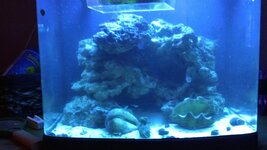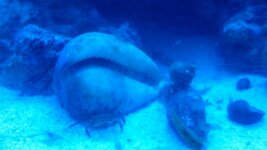BML, Welcome to the world of "box of chocolates" marine life. As Sue well knows, when we get octopuses they are from the wild, not from aquaculture, 99.9% of the time. Sue was close enough and willing to take a long drive (over 6 hours round trip) to
acquire a couple of young hatchlings from a student whos lab animal produced young but it is very, very infrequent that this opportunity exists. The octopus in this thread was purchased through a retailer and was captured by nationals outside the US then imported. A third way we acquire them is through direct collection of animals in the FL Keys. Both imported and local animals show up in various pet shops. Typically, the "Indonesian" octopuses from Live Aquaria are animals in the Abdopus complex (often aculeatus) or in the Macropus complex (a nocturnal group). Their Caribbean offerings have been inconsistent and sometimes not even Caribbean (as I understand it, these come through a wholesaler and LA does not hand select them). Adding to the already complicated acquisition, are California laws that do not allow the sale of O. bimaculoides or O. bimaculatus (collectively referred to as bimacs) so these, though relatively easy to identify, are not common to be able to keep.
Identifying an octopus species is a challenge (often even for those who are well familiar with multiple species) because of their range of sizes and color patterns. None of the suppliers have much of a clue to the species, sex or age of an animal they have in stock. Occasionally a small collector will have caught one either in their aquacultured live rock, while out collecting other animals or will be offered one from a crab or lobster fisherman. The animals that come from out of the country are typically caught in the same areas and are typically one of two species but even that is hit or miss and will not be something the supplier has accurately learned to identify. A few of the collectors have learned a little about visual traits and make a good guess on species (and some species are easier to identify).
Age is not something you can specify and usually won't have much of a clue when you order. This is always a concern since an octopuses life span (for the kind we keep at home) is only 12 -18 months. Size is somewhat helpful but not definitive since species size varies from dwarf to medium and individuals vary considerably within species. Other than animals born in a tank, hatchlings are not available. On occasion very young animals are found but the more common case is and animal from 5 months to 12 months old. Often females will brood after only a month in the tank. My conjecture is that they are the easiest to catch since they go through a period of heavy eating (as well as looking for a mate) just before they lay their eggs. Females with eggs usually live until the eggs hatch and die almost immediately at hatching. While brooding the female rarely leaves the eggs and does not often eat. There have been a few females to live a bit longer but this is the exception (we do know of one and only one species that will lay multiple clutches. Hopefully this little animal will be captive bred for the pet trade in the coming years but it is not currently an option).
Sooo, we try to size our tanks to accommodate the most typical animals (55+ sump or larger) and expect the chocolate to be good but not know exactly what it will be like.




